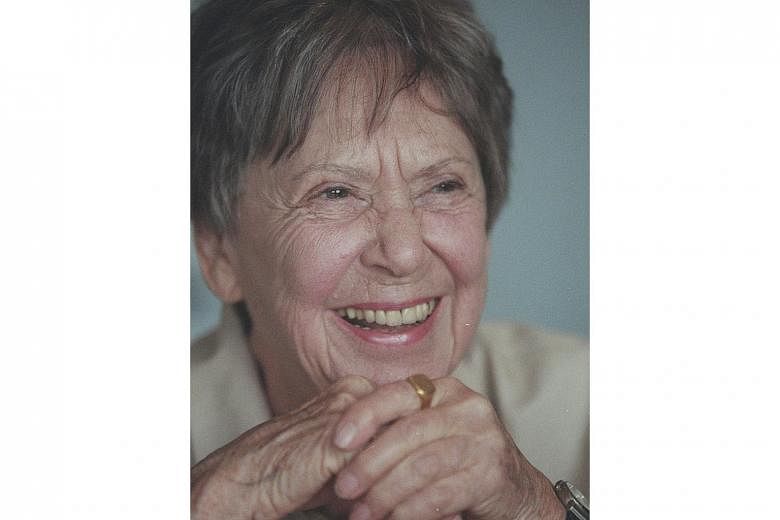NEW YORK (NYTIMES) - Lois Wheeler Snow, a former actress and writer whose criticism of human rights abuses in China was amplified by the legacy of her husband, the American journalist Edgar Snow, author of the landmark book "Red Star Over China," died on April 3 at a hospital in Nyon, Switzerland. She was 97.
Her daughter, Ms Sian Snow, confirmed the death. Her mother had lived in Switzerland since 1959.
Snow was an up-and-coming Broadway actress in 1949 when she married Mr Edgar Snow, who was best known for "Red Star Over China" (1937), a sympathetic portrayal of China's struggling young communist revolutionaries. It introduced many Western readers to Chinese leaders Mao Zedong, Zhou Enlai and others who would go on to lead the People's Republic of China.
"China became part of my life when I met and married Edgar Snow," Snow wrote in an essay in 2011.
On her first visit to that country, in 1970, she and her husband were treated like royalty. She attended a ping-pong match with Mr Zhou, the first premier of the People's Republic; dined with Ms Soong Ching-ling, the wife of Mr Sun Yat-sen; and, notably, stood with her husband alongside Mr Mao on the Tiananmen rostrum during the National Day Parade - a gesture later understood to be a signal from Mr Mao to President Richard Nixon that Beijing was willing to reopen ties with Washington.
When Mr Snow's health began to deteriorate in the early 1970s, Mr Mao and Mr Zhou sent a team of three doctors, four nurses and an interpreter to Switzerland, where the couple were living by then.
Even after her husband died in 1972, Snow remained on friendly terms with Chinese leaders and continued to visit China frequently.
"I was a very privileged person and was driven around in Red Flag limousines with lace curtains," Snow said in an interview with Time Asia in 2000. "I was able to meet a lot of people just because I was Mrs Edgar Snow."
But what began as a warm and vibrant friendship with Chinese officials soured following the government's violent suppression of Tiananmen Square protesters in 1989, which left hundreds of civilians dead.
Snow began to see the Communist Party - the party that she and her husband had so ardently supported over the years - in a different light.
"It just woke me up," she said in the Time Asia interview. "You'd see people being dragged off with bloody faces, for instance. And little by little in my head grew the knowledge that the families of these people were being persecuted in some way."
Snow immediately condemned the crackdown and vowed never to return to China. Over the years, she wrote letters to top Chinese leaders such as Mr Deng Xiaoping and Mr Zhu Rongji, hoping her husband's stature in China could help call attention to the plight of the families affected by the Tiananmen crackdown.
"This is all outside my jurisdiction," she once said. "But I do, through fortune, bear the name of Edgar Snow, and I feel a certain responsibility about the use of the name in China."
In 2000, Snow, then 79, returned to Beijing one last time in the hope of passing on a donation to a prominent activist whose son had been killed during the Tiananmen turmoil.
That visit to China, her last, could not have been more different from her first to the country 50 years earlier. She and her son, Christopher, were subject to surveillance while visiting the cemetery at Peking University, where half of her husband's ashes were buried.
When they tried to meet with the activist Ding Zilin, whose teenage son had been killed in the Tiananmen protests, they were surrounded at the gate of People's University in Beijing, where Ding lived, by at least two dozen plainclothes police officers, filmed surreptitiously and prevented from entering.
Madam Ding later recalled saying to the police who had blocked the meeting, "How can you be so cruel? She's an old friend of China."
Snow was born in Stockton, California, on July 12, 1920, to Mr Raymond Joseph Wheeler, a mayor of Stockton, and homemaker Katherine Kurtz. After studying drama at the College of the Pacific (now the University of the Pacific) in her hometown, Snow moved to New York City, where she studied at the Neighborhood Playhouse and became a founding member of the Actors Studio.
As a young actress, Snow appeared in several Broadway plays, including "The Fifth Season" and the original production of Arthur Miller's "All My Sons".
She met Mr Snow, who was then married to Helen Foster Snow, at a Russian War Relief party in New York in 1946. (Edgar Snow's first marriage ended in divorce.) Not long after Mr Snow and then Ms Lois Wheeler married, in 1949, they found themselves effectively blacklisted from working, suspected of communist ties as the McCarthy era began to unfold. They moved with their two children, Christopher and Sian, to Switzerland, settling near Geneva, in 1959.
Christopher died in 2008. Besides her daughter, Sian, Snow is survived by two grandchildren.
Though her first impressions of China were largely shaped by her husband, in later years Snow needed no help in forming her own opinions about the country that had so influenced her life.
"It's hard even for me to realise that I went for such a long time without being aware of the transgressions of human rights, that it took Tiananmen to wake me up," she said in an interview with The New York Times in 2000.
"There it was on television, in the living room, in front of your face. The kids, my children, were with me. We were screaming. It was like being there."

